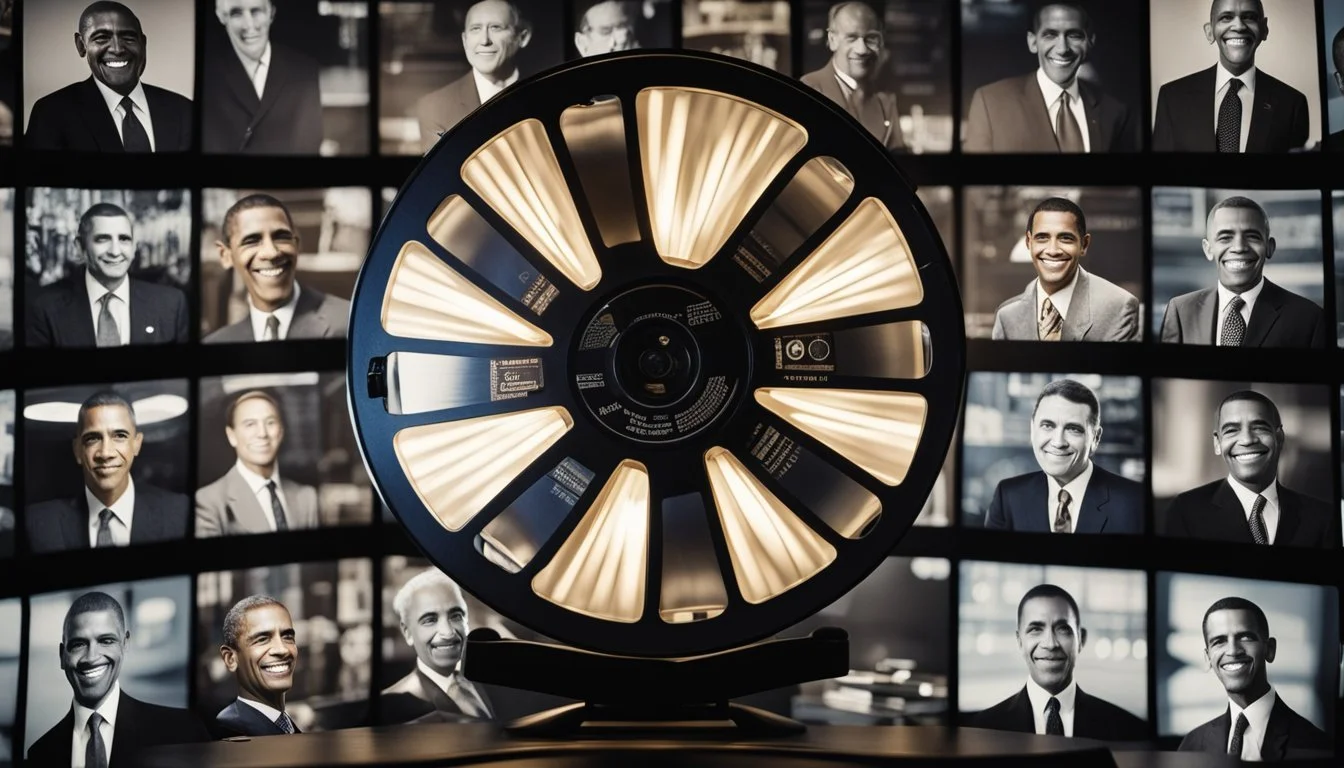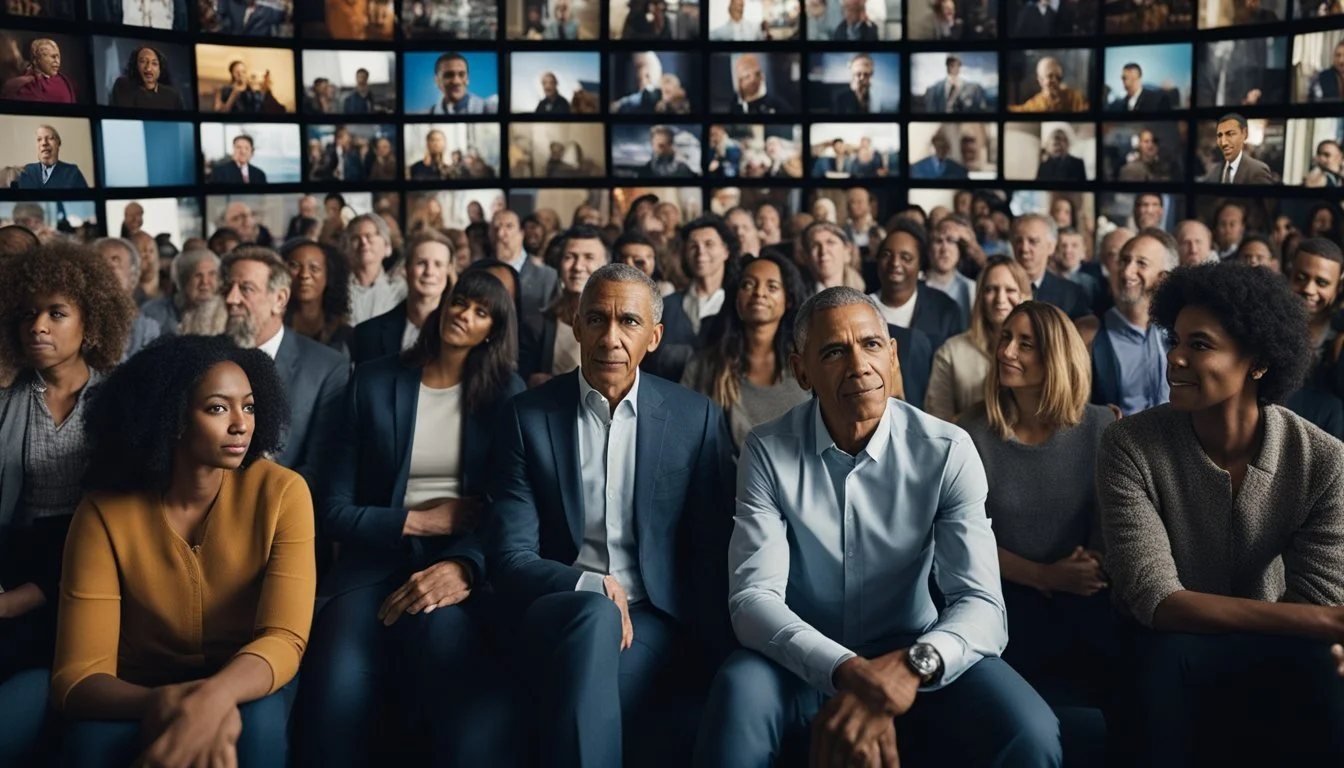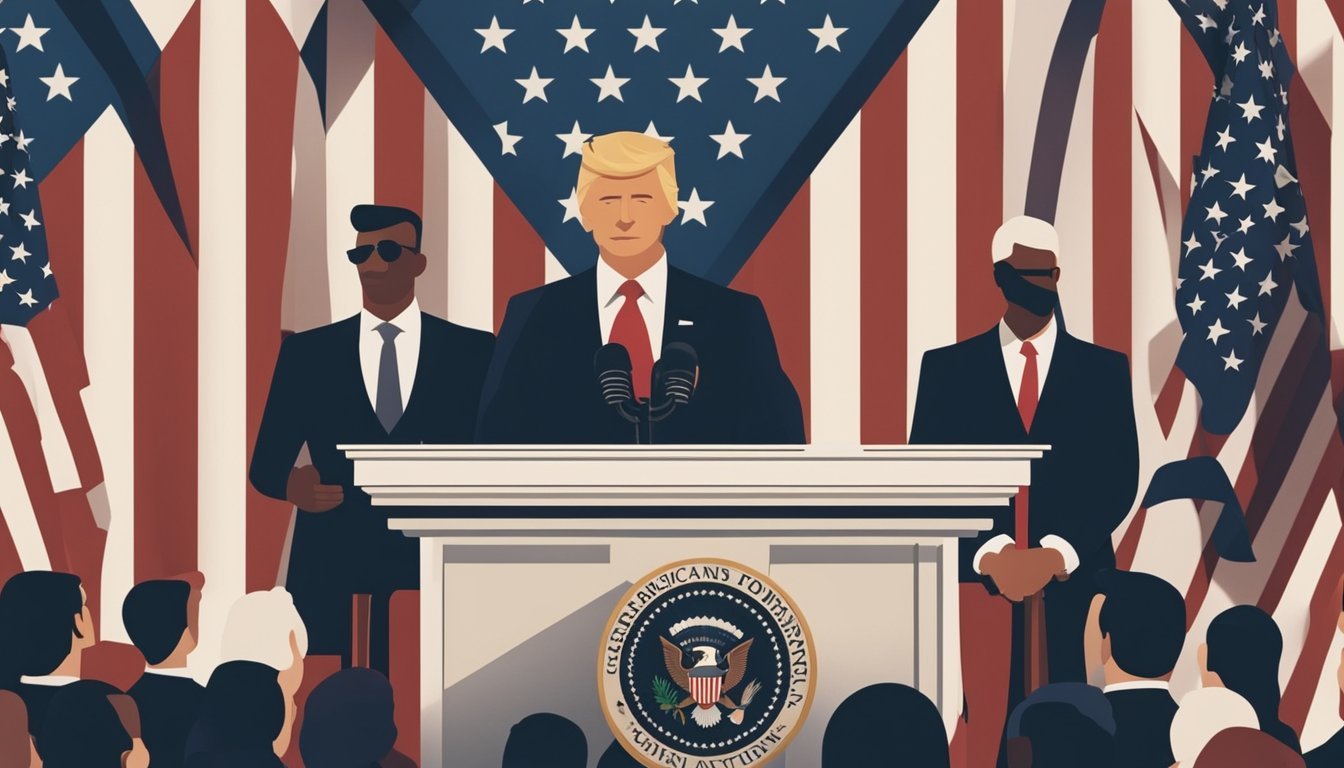12 Enlightening Films About Barack Obama's Historic Presidency
A Cinematic Journey Through Two Transformative Terms
Barack Obama's presidency marked a significant chapter in American history. As the first African American to hold the nation's highest office, his two terms from 2009 to 2017 were filled with notable achievements and challenges that shaped the country's trajectory.
Several films have captured different aspects of Obama's presidency, offering viewers unique insights into his leadership, policies, and personal journey. These documentaries and feature films explore themes like his oratory skills, landmark legislation, foreign policy decisions, and cultural impact. By examining Obama's time in office from various angles, these movies provide a multifaceted look at a transformative period in U.S. politics.
1) The Final Year (2017)
"The Final Year" offers a captivating behind-the-scenes look at President Barack Obama's foreign policy team during his last year in office. Directed by Greg Barker, this documentary provides intimate access to key figures shaping America's global strategy.
The film follows prominent officials including Secretary of State John Kerry, UN Ambassador Samantha Power, and Deputy National Security Advisor Ben Rhodes. It chronicles their efforts to solidify Obama's diplomatic legacy in the face of global challenges.
Viewers witness the team's work on crucial issues like the Iran nuclear deal, climate change, and relations with Cuba. The documentary captures both the triumphs and setbacks of international diplomacy during this pivotal period.
"The Final Year" offers a unique perspective on the complexities of foreign policy decision-making. It presents an unvarnished view of the dedication and passion driving these public servants in their final months on the job.
Through its fly-on-the-wall approach, the film provides valuable insights into the inner workings of the Obama administration's foreign policy apparatus. It serves as an important historical record of this consequential period in American diplomacy.
2) From the Front Porch to the Oval Office
Barack Obama's journey to the presidency was remarkable. He rose from humble beginnings to become the first African-American President of the United States.
The film "Barry" (2016) explores Obama's early life as a college student in New York City. It offers insights into his formative years and the experiences that shaped his worldview.
"Southside with You" (2016) depicts the first date between Barack Obama and Michelle Robinson in Chicago. The film provides a glimpse into their budding relationship and shared aspirations.
"The Final Year" (2017) documents the last 12 months of Obama's presidency. It showcases his administration's efforts on foreign policy and global challenges during their final year in office.
"American Factory" (2019), produced by the Obamas' production company, examines the cultural clash when a Chinese company opens a factory in Ohio. While not directly about Obama, it reflects his post-presidency focus on social issues.
These films offer unique perspectives on Obama
3) Becoming Obama
"Becoming Obama" (2009) offers an intimate look at Barack Obama's journey to the presidency. The documentary explores his early life, education, and political rise in Chicago.
The film highlights Obama's mixed-race background and how it shaped his worldview. It delves into his time as a community organizer and his years at Harvard Law School.
Viewers gain insight into Obama's initial foray into politics, including his role as an Illinois state senator. The documentary also covers his keynote speech at the 2004 Democratic National Convention, which catapulted him onto the national stage.
"Becoming Obama" examines the challenges Obama faced during his 2008 presidential campaign. It showcases his ability to inspire hope and mobilize a diverse coalition of supporters.
The film provides a nuanced portrait of Obama as a politician and person, revealing the experiences that molded his leadership style and vision for America.
More information on "Becoming Obama" (2009)
4) The Obama Years: The Power of Words (2017)
This documentary explores Barack Obama's skill as an orator and the impact of his most significant speeches. It examines six of Obama's iconic addresses, highlighting his ability to inspire and connect with audiences through powerful rhetoric.
The film features insights from notable figures like Pulitzer Prize-winning historian Doris Kearns Goodwin and former Obama speechwriter Jon Favreau. They discuss the crafting and delivery of Obama's speeches, as well as their historical context.
"The Obama Years: The Power of Words" showcases how Obama used language to address critical moments in his presidency. It covers speeches from his 2004 Democratic National Convention keynote to his farewell address in 2017.
The documentary emphasizes Obama's role as both a writer and orator. It explores how his background and experiences shaped his unique voice and messaging style throughout his political career.
While focusing on Obama's oratory prowess, the film largely avoids delving into specific policy debates or partisan politics. Instead, it concentrates on the art of speechmaking and its importance in presidential leadership.
5) Southside with You (2016)
"Southside with You" offers a unique glimpse into the early relationship of Barack and Michelle Obama. The film chronicles their first date in Chicago during the summer of 1989.
Parker Sawyers portrays a young Barack Obama, while Tika Sumpter plays Michelle Robinson. The movie captures their initial interactions as they explore the city's South Side.
Director Richard Tanne crafts a biographical romantic drama that showcases the future First Couple's chemistry. The film depicts their conversations on politics, family, and aspirations.
"Southside with You" premiered at the 2016 Sundance Film Festival, garnering positive reviews. Critics praised the performances and the intimate portrayal of the Obamas' budding romance.
The movie provides insight into the personal lives of two influential figures before they entered the political spotlight. It offers a humanizing perspective on the future President and First Lady.
6) Obama: In Pursuit of a More Perfect Union (2021)
This HBO documentary series offers a comprehensive look at Barack Obama's life and presidency. Directed by Peter Kunhardt, the three-part series explores Obama's journey from his early upbringing to becoming the 44th U.S. President.
The documentary is set against the backdrop of America's unfolding racial history. It examines how Obama's personal experiences shaped his political career and presidency.
Notable figures such as Al Sharpton, Ta-Nehisi Coates, and David Remnick provide insights throughout the series. The film also features archival footage of Obama speaking at various points in his career.
"Obama: In Pursuit of a More Perfect Union" takes its title from Obama's pivotal 2008 campaign speech on race relations. The series spans over five hours, aiming to be a definitive account of Obama's life and presidency.
While Obama himself is not interviewed for the documentary, his voice is heard through past speeches and interviews. The series explores both personal and political aspects of Obama's journey to the White House.
7) 13th (2016)
Ava DuVernay's documentary "13th" offers a powerful examination of the intersection between race, justice, and mass incarceration in the United States. While not focused solely on Barack Obama's presidency, the film provides context for his administration's efforts to address criminal justice reform.
The documentary explores the 13th Amendment to the Constitution, which abolished slavery except as punishment for a crime. It traces how this loophole has been exploited throughout history, leading to the disproportionate incarceration of African Americans.
Obama's presidency is featured as a period of potential change. The film highlights his visits to federal prisons and his administration's attempts to reduce mandatory minimum sentences for non-violent drug offenses.
"13th" also examines the limitations Obama faced in implementing comprehensive criminal justice reform due to political opposition and systemic challenges. The documentary serves as a thought-provoking exploration of racial inequalities in the American justice system during and beyond Obama's tenure.
More information on "13th" (IMDB)
8) The Way I See It (2020)
"The Way I See It" offers a unique perspective on Barack Obama's presidency through the lens of Pete Souza, the Chief Official White House Photographer. This documentary showcases Souza's intimate photographs of Obama's time in office.
The film provides viewers with behind-the-scenes glimpses of key moments during Obama's administration. It captures both historic events and personal interactions, offering a nuanced portrait of the 44th President.
Director Dawn Porter weaves together Souza's photographs with his commentary, creating a narrative that spans Obama's two terms. The documentary also touches on Souza's experiences working with President Ronald Reagan.
"The Way I See It" not only celebrates Obama's presidency but also highlights the importance of photojournalism in documenting history. It serves as a visual record of a significant period in American politics.
9) The Road We've Traveled (2012)
"The Road We've Traveled" is a 17-minute documentary film directed by Davis Guggenheim. It chronicles the significant events and decisions of Barack Obama's first term as president.
The film was produced by Obama's re-election campaign and narrated by Academy Award-winning actor Tom Hanks. It aims to highlight the challenges faced by the administration and the progress made during Obama's presidency.
The documentary covers major topics such as the economic crisis, healthcare reform, and the mission to capture Osama bin Laden. It features interviews with key figures from Obama's administration, including Vice President Joe Biden and former Chief of Staff Rahm Emanuel.
"The Road We've Traveled" serves as a campaign tool, reminding viewers of the administration's accomplishments and the difficult choices made during Obama's first term. The film received both praise and criticism for its portrayal of events and its role in the re-election campaign.
More information on "The Road We've Traveled"
10) American Factory (2019)
"American Factory" offers a unique glimpse into the complexities of globalization and cultural differences in the workplace. This documentary chronicles the reopening of a shuttered General Motors plant in Ohio by Chinese company Fuyao Glass.
The film explores the challenges and tensions that arise as American and Chinese workers attempt to collaborate. It highlights the stark contrasts in work cultures, management styles, and labor expectations between the two countries.
Directors Steven Bognar and Julia Reichert capture candid moments that reveal the human impact of economic shifts. The documentary presents a balanced view, showing both the opportunities and difficulties faced by workers and management alike.
"American Factory" gained significant attention as the first film distributed by Barack and Michelle Obama's production company, Higher Ground Productions. It went on to win the Academy Award for Best Documentary Feature in 2020.
The film provides valuable insights into the changing landscape of American manufacturing and the global economy. It presents a thought-provoking look at the realities of international business in the 21st century.
More information on American Factory
11) We're Better Than This (2020)
"We're Better Than This" is a documentary that explores Barack Obama's presidency through the lens of moral leadership. The film examines how Obama navigated complex ethical challenges during his time in office.
Director Tonja Renée Stidhum interviews former White House staff, political analysts, and ethics experts. They discuss key moments that tested Obama's principles and decision-making.
The documentary highlights Obama's responses to issues like healthcare reform, climate change, and racial tensions. It shows how he aimed to unite Americans around shared values despite partisan divides.
"We're Better Than This" provides insight into Obama's leadership philosophy and its impact on his policies. The film argues that his approach set a new standard for presidential ethics and integrity.
12) Obama: All Access (2009)
"Obama: All Access" provides an intimate look at Barack Obama's historic journey to the presidency. The documentary follows Obama's campaign trail and early days in office, offering viewers unprecedented behind-the-scenes footage.
The film captures candid moments with Obama and his family, showcasing the personal side of the 44th President. It includes interviews with campaign staff, close advisors, and Obama himself, shedding light on the challenges and triumphs of his groundbreaking campaign.
Viewers gain insight into Obama's decision-making process and leadership style during crucial moments of his early presidency. The documentary also explores the impact of Obama's election on American society and politics.
"Obama: All Access" presents a balanced portrayal of the President, highlighting both his strengths and the obstacles he faced. It serves as a valuable historical record of a pivotal moment in American politics.
More information on "Obama: All Access"
Significant Policies and Legislation
Barack Obama's presidency was marked by several landmark policies and legislative achievements. These initiatives aimed to address pressing issues in healthcare, financial regulation, and environmental sustainability.
Affordable Care Act
The Affordable Care Act, also known as Obamacare, was signed into law in 2010. It represented a major overhaul of the U.S. healthcare system. The act aimed to expand health insurance coverage to millions of uninsured Americans.
Key provisions included:
Prohibiting insurers from denying coverage due to pre-existing conditions
Allowing young adults to stay on their parents' insurance until age 26
Establishing health insurance marketplaces
Expanding Medicaid eligibility
The ACA faced significant opposition and legal challenges. However, it remained largely intact throughout Obama's presidency. It led to a substantial decrease in the number of uninsured Americans.
Dodd-Frank Wall Street Reform
The Dodd-Frank Wall Street Reform and Consumer Protection Act was enacted in 2010. It was a response to the 2008 financial crisis. The act aimed to increase oversight of financial institutions and protect consumers.
Major components included:
Creation of the Consumer Financial Protection Bureau
The Volcker Rule, limiting banks' risky investment practices
Enhanced regulation of derivatives
New liquidation authority for failing financial firms
Dodd-Frank faced criticism from the financial industry for being overly burdensome. Supporters argued it was necessary to prevent future economic crises.
Renewable Energy Initiatives
Obama prioritized renewable energy and climate change mitigation throughout his presidency. His administration implemented several key initiatives to promote clean energy development.
Notable policies included:
The Clean Power Plan, setting limits on power plant emissions
Increased fuel efficiency standards for vehicles
Investments in renewable energy research and development
Joining the Paris Climate Agreement
These initiatives faced opposition from fossil fuel industries and some lawmakers. However, they contributed to significant growth in renewable energy sectors like solar and wind power.
Key Moments During His Presidency
Barack Obama's presidency was marked by several significant events that shaped both domestic and foreign policy. These moments demonstrated his leadership approach and left lasting impacts on the United States and its global relationships.
Osama Bin Laden Raid
On May 2, 2011, President Obama announced the successful operation that led to the death of Osama bin Laden. The raid on bin Laden's compound in Abbottabad, Pakistan was the culmination of years of intelligence gathering and planning.
Obama authorized the mission, codenamed Operation Neptune Spear, after months of deliberation. Navy SEAL Team Six carried out the raid, which resulted in bin Laden's death and the seizure of valuable intelligence materials.
This event was widely seen as a major victory in the War on Terror and boosted Obama's national security credentials. It also provided a sense of closure for many Americans, particularly those affected by the 9/11 attacks.
Iran Nuclear Deal
The Joint Comprehensive Plan of Action (JCPOA), commonly known as the Iran Nuclear Deal, was signed on July 14, 2015. This agreement between Iran and six world powers aimed to prevent Iran from developing nuclear weapons in exchange for sanctions relief.
Obama played a crucial role in negotiating the deal, which required Iran to limit its nuclear program and submit to international inspections. The agreement was seen as a diplomatic breakthrough and a key achievement of Obama's foreign policy.
Critics argued the deal didn't go far enough, while supporters praised it as a non-military solution to a complex international issue. The JCPOA remained controversial, with subsequent administrations taking different stances on its implementation and effectiveness.
Cuban Thaw
Obama initiated a historic shift in U.S.-Cuba relations, known as the Cuban Thaw. This process began in December 2014 with the announcement of a prisoner exchange and the restoration of diplomatic ties between the two countries.
Key steps in this process included removing Cuba from the U.S. list of state sponsors of terrorism, reopening embassies in both countries, and easing travel and trade restrictions. Obama became the first U.S. president to visit Cuba in 88 years when he traveled there in March 2016.
The Cuban Thaw marked a significant departure from decades of U.S. policy towards Cuba. It aimed to engage with Cuba through diplomacy and commerce rather than isolation. This shift was praised by many as a step towards normalizing relations, though it also faced criticism from those who believed it made too many concessions to the Cuban government.







